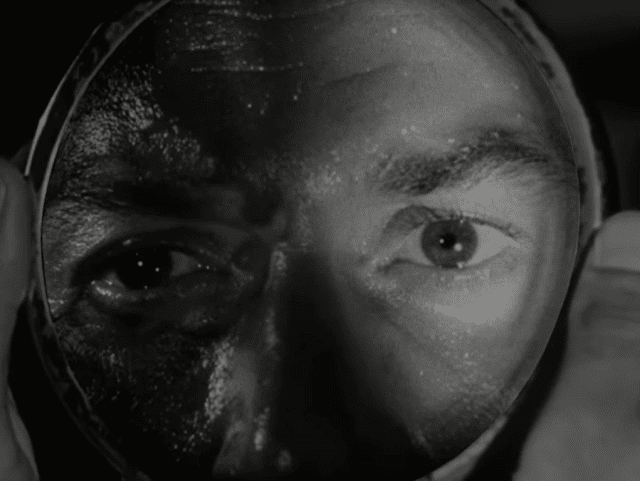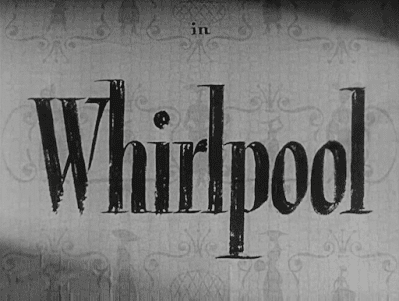It does however subject the woman to the role of a pawn in a game of power between two competing schools of theories and therapeutic techniques: psychoanalysis and hypnotism.
The film opens with a promising scene in which Gene Tierney, playing the wife of a super-eminent psychoanalysis, is caught stealing a valuable broach from a store.
Clearly she is able to afford the item she steals, as she lives a massively affluent lifestyle, and so the premise is strong.
However, as we shall see, viewers never get to the bottom of why Gene Tierney's character Ann behaves like this. She is quickly branded a kleptomaniac, and any decent modern film or novel would proceed along the lines of discovering what is at the root of this.
Otto Preminger's Whirlpool however, opts to shove and buffet the female between two men who represent two (here) opposing approaches to therapy.
It's a rather weak role for Gene Tierney but she makes more of it than there may be in the script and remains vulnerable and paranoid to the last; and here comes the movie's tagline:
Tomorrow she will know what she did today!
 |
| Jose Ferrer offering bad hypnosis in the psychological Whirlpool of 1949 |
 |
| Gene Tierney - shoplifter out cold in Whirlpool (1949) |
 |
| Gaslit with madness in classic film noir - Gene Tierney in Whirlpool (1949) |
 |
| Troubled Gene Tierney in Whirlpool (1949) |
For the first half of the film, Gene Tierney is tasked by director Otto Preminger to look troubled and helpless, when she isn't trying to supress her volcanic hoard of psychological bother; while in the second half she all but disappears as her husband takes over in order to play the detective and clear her name.
This is potentially one of the finest noir tropes that could be conceived of: the psychoanalyst as detective. It does however push to the side the star of the story, the wifelet who is buffeted by her own internal troubles. In its ideal form, Whirlpool (1949) by Otto Preminger would be a film noir about Gene Tierney's character Ann Sutton, and not the two competing schools of mental healing, as represented by the two men; Richard Conte, the psychoanalyst, obviously good; and Jose Ferrer, the hypnotist, obviously bad.
 |
| Women echoing portraits of women is a solid trope from classic film noir. Gene Tierney in Whirlpool (1949) |
 |
| Cops on the case. The stable legal mind in classic psychological film noir Whirlpool (1949) |
 |
| Is the women mad or not? Classic over-suggestive film noir tropes. Richard Conte and Gene Tierney in Whirlpool (1949) |
It doesn't in fact matter if Gene Tierney ever finds out tomorrow what it was that she did today, for the simple reason that if she is not hypnotised and unable to control herself, then she is on the other hand prey to the subconscious aspects of her past that only her husband, the super-famous psychoanalyst, can reveal.
The true weakness of the culture which produced Whirlpool is revealed here: any casual observer might argue that the wifelet's kleptomania may well be brought on by her subjugation within the marriage. She acts devoted to her husband, and she feels devoted to her husband, but nobody is that much of a vacuum and everybody needs a mental locus for their own feelings, and an inner life.
Denied everything by the fact that she has it all and is expected to be happy with that, it's not surprising that such a wife might through this kind of neglect develop a profound inner and criminal secret, such as shoplifting. There is clearly no excitement in her life and she is expected to accept that because she has such a good husband, she should be happy with that.
This is a message that needs to be read from the movie, as it is never addressed. We never find out why Gene Tierney's character feels the need to steal; instead she is zombified by both men, one of them literary turning her into a sleepwalking actor in his own murderous game. On top of that, the other major takeaway is to discredit hypnotherapeutic practise, in the face of America's huge interest in psychoanalysis, nowhere better expressed in this period, than in film noir.
None of this is to make Whirlpool either a bad movie, or an unenjoyable one; it's neither. The pacing, acting and action is great, and if you can bear the overtones, it's one of the more superior film noirs of its day. Other than the perilous position of the woman in marriage, the theme of the movie is not so unusual: hypnosis as a weapon.
 |
| Desperate moments in classic psychological film noir. Jose Ferrer in Whirlpool (1949) |
 |
| Pseudo-science. Look into your own eyes, self hypnosis in Whirlpool (1949) |
 |
| Shadows in the night, film noir Whirlpool (1949) |
 |
| Charles Bickford, Richard Conte and Gene Tierney in Whirlpool (1949) |
Weirdly, it's psychoanalysis which comes off the poorer as the plot relies heavily on Richard Conte, as the famous analyst, breaking patient-doctor confidentiality frequently and with no misgivings at all. If anyone were at the same time to believe that hypnosis could achieve in real life what it does here, then it would be likely our police forces would be running massive anti-hypnosis squads to counter the huge amount of crime that would entail.
With little effort, Jose Ferrer, who plays the oily hypnotist Korvo here, appears to be able to make his victim carry out virtually any task, as well as hypnotise himself to create alibis when he is supposed to be in hospital.
It's almost as if psychology and hypnotism are both revealed to be pseudo-sciences.
Spin in the Whirlpool at Wikipedia
FILM NOIR 1949
 |
| Real Soviet Threat - - or Smoke and Mirrors? |
Film noir, not quite a genre, not quite a movement, and not even a complete style, was more of a diffuse cinematic clustering of talent, expressing new ideas, and experimenting with new techniques, while delving into the more concealed psychological and moral concerns of its day.
Samson and Delilah (Paramount)Battleground (MGM)Jolson Sings Again (Columbia)Sands of Iwo Jima (Republic)I Was a Male War Bride (20th Century Fox)Twelve O'Clock High (20th Century Fox)The Heiress (Paramount)Pinky (20th Century Fox)All the King's Men (Columbia)Little Women (MGM)Look for the Silver Lining (20th Century Fox)
In 1949, the international emergencies of the early 1950s were just months away, including the Korean War, and all of this was framed in paranoid terms, and the public were led to believe that the Soviets were working flat out to expand their deadly empire.
Soviets were in fact everywhere, certainly spying on government and certainly infiltrating workplaces in the form of labor activists. Elsewhere, Communists could be found arguing for race relations - - by which I mean that if you presented arguments for racial equality in America in 1949, you would most certainly be seen as a Communist by many.
 |
| Truman - Thanksgiving - 1949 |
However the Soviet Union's awful losses in the war hardly allowed it to challenge America, although Truman and his entourage worked hard to spread the idea that all revolutionaries were in fact Communists, an idea that was hammered so relentlessly into the American public mind that eventually the simple mention of the word 'Communist' was enough to simply suggest anti-social or leftist behaviour of any sort.





